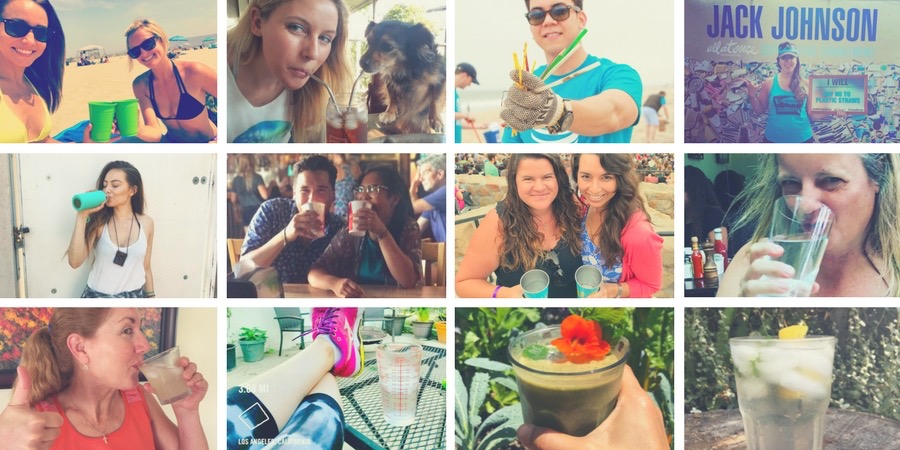Strawless Forever

As Strawless Summer comes to a close, Heal the Bay would like to thank all of our partners and community advocates for making this campaign possible.
In America, food and drinks are routinely served with a side of plastic.
One coffee comes with a cup, sleeve, lid, stirrer, straw, sugar packet and cream. A breakfast burrito includes a wrap, container, salsa, utensils and bag. But just because it’s always on the menu, doesn’t mean we have to order it.
If you’ve been to one of our beach cleanups in greater Los Angeles, you don’t need crazy stats to shock you – like an estimated 500 million plastic straws being used in the U.S. every day1. You’ve seen our pollution challenges first-hand. In fact, around 40% of the trash found in the environment is beverage-related2, and single-use plastic straws are one of our most commonly found items at cleanups.
“No straw, thank you”.
This simple statement, echoed by patrons in restaurants, bars, coffee shops and to-go eateries, is the murmur of a movement aimed at combating the single-use plastic convenience craze.
Earlier this year, Heal the Bay joined the straws-upon-request movement and launched the Strawless Summer campaign to raise awareness and reduce unneccessary plastic straw usage in Los Angeles County.
Here are a few highlights:
“Straws Upon Request”
We’ve come to expect plastic straws available at dispensers, tossed on our tables and placed in our drinks without asking for them first. What would happen if we turned the tables? This is what we aimed to address in our “Straws Upon Request” Study.
During Strawless Summer, we partnered with three local Santa Monica establishments (Pono Burger, The Misfit, Ingo’s Tasty Diner) to pilot a 4-week program aimed at reducing plastic straw distribution. Patrons wouldn’t be given straws by waitstaff unless they asked for them, in the same way customers must ask for glasses of water during the drought.
Did people totally freak out? No. Was it easy to implement? Yes. Did it earn the businesses major goodwill with some locals? Yep, it most certainly did.
If patrons asked for straws (one restaurant said this happened about half the time), the waitstaff explained their absence from the experience was part of a local effort to be more green. Then, the restaurant offered paper or plastic straws. If folks needed a plastic straw, they could have access to one. But for folks who didn’t need or want them, the single-use plastic straw was absent from the table.
“We chose to participate in a Strawless Summer because it is great for the environment and the Bay. We are a locals restaurant and have a huge locals following a lot of whom spend a good amount of time in the Bay [and] ocean,” said one restaurant manager who participated in the study.
See more local establishments who pledged to go straws upon request during Strawless Summer.
MonSTRAWsity Hits Home
Here’s a frightening truth: the average American family uses 1,752 straws in a year3. To visualize this fact, we collected plastic straws at our coastline cleanups and pieced together the MonSTRAWsity, whose suit is made out of… 1,752 straws. The MonSTRAWsity spent the summer wreaking havoc on the Santa Monica Pier near the Santa Monica Pier Aquarium, in the South Bay and all over Los Angeles. By the end of Summer, the MonSTRAWsity was even surfing the airwaves.
The Sipping Point
It’s estimated that by 2050, there will be more plastic in the sea than fish by weight. Another study shows microscopic plastic fibers are being detected in 83% of drinking water worldwide and a whopping 94% of U.S. tap water4. Microplastics are even showing up in table salt, according to new research.
Heal the Bay’s Nothin’ But Sand, Adopt-a-Beach and Suits on the Sand cleanup volunteers together have collected close to 13,000 plastic straws and stirrers5 from L.A. County beaches in 2017 alone.
Local inaction is our own worst enemy; however, on the flip side, local action is our best opportunity. Heal the Bay will continue to work with businesses, environmental partners and local municipalities to curb the proliferation of single-use plastic pollution, including advancing safe alternatives to single-use plastic straws and only providing straws upon request.
L.A. doesn’t have to suck. Let’s rethink the drink and stop the alarming plastic pollution trends from continuing to increase.
Learn more about the benefits of skipping the straw at LASucks.org
Looking for something fun to share? Download this amazing poster below created by illustrator Daniela Garreton – please make sure to give her credit for this masterpiece. (Download).
Our Strawless Summer 2017 campaign would not be possible without these local water warriors: Thank you to Mick and the team at ZehnerGroup, Susan Lang (creator of the MonSTRAWsity and Heal the Bay volunteer extraordinaire), Andrea Maguire and the STRAWS documentary team, SoHo House Malibu, All At Once, Jack Johnson and the Ohana Foundation, Lonely Whale Foundation, 5 Gyres Institute, Klean Kanteen, Simone Boyce and KTLA 5, and all the awesome local businesses who pledged to go Strawless or “Straws Upon Request”, we salute you!
Special shout outs to these local businesses for their participation in Strawless Summer:
Pono Burger, The Misfit, Ingo’s Tasty Diner, Bareburger Organic, Laurel Tavern, Hermosa Beach Fish Shop, Beckers Bakery & Deli, Brother’s Burritos, Tallulas and Watermans Safehouse
Sources:
1. “The Be Straw Free Campaign”. National Park Service Commercial Services. (Last update 11/26/2013) https://www.nps.gov/commercialservices/greenline_straw_free.htm
2. Plastics BAN List. Publication. 5 Gyres, Clean Production Action, Surfrider Foundation, USTREAM. 2016. http://d3583ivmhhw2le.cloudfront.net/images/uploads/publications/PlasticsBANList2016.pdf
3. “The Be Straw Free Campaign”. National Park Service Commercial Services. (Last update 11/26/2013) https://www.nps.gov/commercialservices/greenline_straw_free.htm
4. “New Research Shows Plastic Fibers in Drinking Water”. Plastic Pollution Coalition. (published 9/6/2017) http://www.plasticpollutioncoalition.org/pft/2017/9/6/microfibers-the-plastic-inside-us
5. Heal the Bay’s Marine Debris Database. (data pulled from 1/1/2017-9/21/2017) http://sites.healthebay.org/MarineDebris/MDDB/


